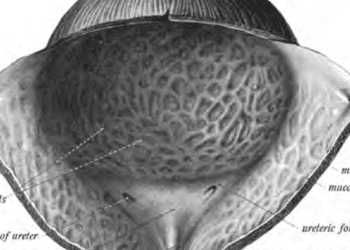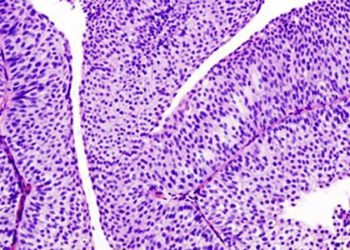No significant increased risk of bladder cancer with pioglitazone use
1. This study demonstrated no significant association between the risk of bladder cancer and either pioglitazone use or duration of pioglitazone therapy.
2. While there was no association between pioglitazone use and non-Hodgkin lymphoma, melanoma, breast cancer, lung cancer, endometrial cancer, colon cancer, rectal cancer, or kidney cancer in this study, associations were noted with pancreatic cancer and prostate cancer.
Evidence Rating Level: 1 (Excellent)
Study Rundown: Pioglitazone is a prescription medication used to treat diabetes that falls under the thiazolidinedione class. After animal studies revealed a potential increased risk of bladder cancer, the FDA and drug manufacturer launched a 10-year observation study that evaluated the risk of pioglitazone use and bladder cancer, and the European Medicines Agency initiated an observational study on pioglitazone use and the risk of 10 additional cancers in humans. The interim analyses of these studies showed no association between pioglitazone use and bladder cancer overall or with any of the other 10 cancers analyzed. However, they did reveal and association between pioglitazone use of two years duration or longer and a 1.4 fold risk of bladder cancer. This article details the follow-up results for both of these studies.
Similar to the interim results, the follow-up results demonstrated no association between pioglitazone use and bladder cancer overall. However in contrast to the interim results, the follow-up study found an association between pioglitazone use and risk of both pancreatic and prostate cancer, but found no association between duration of pioglitazone use and bladder cancer risk. The changes in results between the interim and final analysis were thought to most likely represent an unmeasured confounding variable. Strengths of these studies included the large sample size and a long follow-up period extending up to 16 years. Limitations to these studies included their observational design and the possibility of additional overlooked and unmeasured confounding factors. Nevertheless, these findings are reassuring for both clinicians and patients with regards to pioglitazone use and bladder cancer. Moreover, the observed associations between pioglitazone use and pancreatic and prostate cancer represent important areas for future investigation and corroboration.
Click to read the study, published today in JAMA
Click to read an accompanying editorial, published today in JAMA
Click to read an accompanying editorial, published today in JAMA
Relevant Reading: Thiazolidinediones and associated risk of bladder cancer: a systematic review and meta-analysis
In-Depth [prospective cohort, case control]: This study utilized the Kaiser Permanente Northern California diabetes registry to identify individuals who had a diagnosis of diabetes by January 1, 1997 and were 40 years or older, ultimately including 34 181 individuals who had received pioglitazone and 158 918 who had never received pioglitazone. Of the total cohort, 1261 individuals had received a diagnosis of bladder cancer at the end of the follow-up period, which ranged from 0.1 to 16 years (median 7.2 years) among individuals who had never received pioglitazone and ranged 0.2 to 13.2 years (median 6.1 years) among individuals who had received the medication. There was no association detected between pioglitazone use and bladder cancer risk overall (HR 1.06, 95%CI 0.89-1.26), or between duration of pioglitazone use and bladder cancer risk. A nested case control study was performed within the cohort to account for various confounding factors including smoking status, race, and occupational exposures, and found a similar association to the cohort study for pioglitazone use and bladder cancer (OR 1.14, 95%CI 0.79-1.65). There was no significant link between pioglitazone use and 8 of the 10 cancers examined. However, increased risk of pancreatic cancer (HR 1.41, 95%CI 1.16-1.71) and prostate cancer (HR 1.13, 95%CI 1.02-1.26) were observed.
Image: CC/Wiki
©2015 2 Minute Medicine, Inc. All rights reserved. No works may be reproduced without expressed written consent from 2 Minute Medicine, Inc. Inquire about licensing here. No article should be construed as medical advice and is not intended as such by the authors or by 2 Minute Medicine, Inc.






